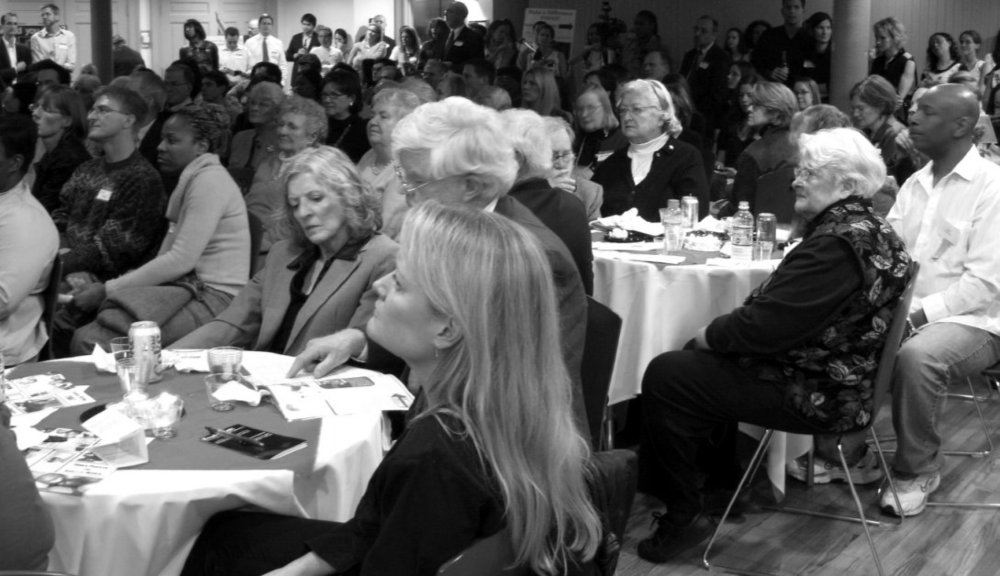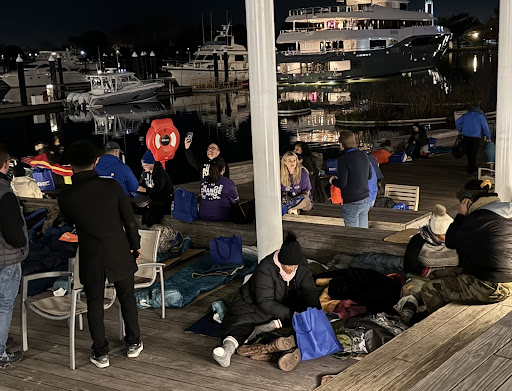The Dinner Program for Homeless Women ceased to exist on Friday, Feb. 27. The program has now introduced its new name and image, Thrive DC. Loud drums broke through the crowd’s chatter as the DPHW’s Evolution dinner celebrated the change.
The new name reflects a larger reexamination of the organization’s mission. Founded in 1979 in response to the District’s first major wave of homelessness, it has moved far beyond simply providing dinners for homeless people, to offering them a range of social services to help them end their homelessness, said executive director Erika Barry.
“Our name hasn’t fit us for so long,” said Barry. “It’s not reflective of our values, our emphasis on the individual, and we didn’t want to have a name that in any way stigmatized the people that we serve or made it difficult to access us. The people we serve chose this name.”
The program has been long housed at the First Congregational Church UCC at 10th and G Streets but is currently operating out of temporary quarters at 309 E Street NW while its offices are being renovated. Thrive DC provides a variety of help for needy people stopping in. There are washers and dryers, showers, phones and a computer lab for their use. Visitors can also take advantage of legal counseling and veteran’s assistance, HIV testing as well as a range of therapeutic and educational groups. Classes and workshops on a variety of subjects are offered as people wait for their dinner.
“While they are there waiting for their meal we’re providing them with the knowledge and tools they can use to take care of themselves and make better choices,” Barry said.
The celebration began with Reverend David Bowers, vice president of Thrive DC, presenting the stories of clients and introducing guest speakers Lorna Fleming and Jason Hillman.
Fleming and Hillman both spoke about the slippery descent into homelessness and the trials that followed as they fought for survival.
Fleming talked about how she became homeless, not knowing the area and having no friends or family nearby to help her. Hillman, a homeless youth, ran away from home and fell into drugs and alcohol. After overcoming his addiction and seeking help, Hillman found Thrive DC. He told the crowd, “no service centers I came across were like Thrive DC,” and that the staff was warm and ready to help.
Jeff Chubb, the outreach manager for Helping Individual Prostitutes Survive, or HIPS, commented on the work that Barry and her colleagues at Thrive DC accomplish.
“I originally started working with DPHW,” Chubb said. “When they were DPHW, when they worked with mental health, doing outreach within their program. Normally when people act out, they are asked to leave; they are laughed at, stigmatized in some way. At DPHW (Thrive DC) they really stand beside folks and treat them compassionately.”

Another highlight of the dinner was New Perspectives, a photojournalism exhibit displaying one day in the life of six homeless men and women. One of the photographers, Lisa Moore, mingled with the crowd as they walked by her pieces. Moore has been homeless for two and a half years, sleeping in a shelter at night and wandering the city during the day.
“Once you become homeless it becomes very stressful,” Moore said. “You do get in a rut and its just like, ‘what am I going to do today?’”
Many of the photos chronicled her more intimate experience with Washington, D.C., standing in line for food stamps, a park squirrel she feeds, and finding a man sleeping behind a sheet of plywood in an alley.
“I’ve become so immune to what I see,” Moore said. “This is what I live through, this is what I see every day. Do other people see the same thing?”
Prints are still available through Thrive DC at $20 for an 8×10 print or $70 for a framed print.







